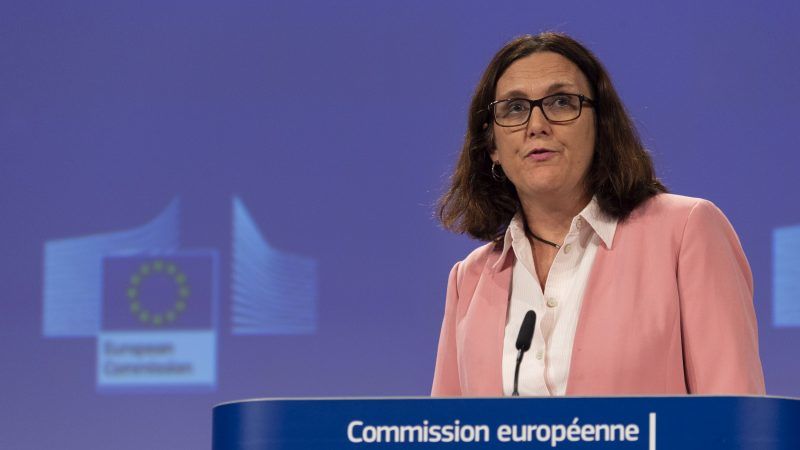Commissioner Cecilia Malmström at a press conference in Brussels on 17 October 2018. [European Commission]
The EU’s Trade Commissioner Cecilia Malmström said on Wednesday (17 October) that the “ambitious” trade deal concluded with Vietnam could “pave the way” for an agreement with the Association of South East Asian Nations (ASEAN), despite scepticism on the other side.
The college of commissioners adopted on Wednesday the EU-Vietnam trade and investment agreements. Now the deal has to be ratified by the Council and the European Parliament.
The successful conclusion of the negotiations followed member states’ green light to sign the trade and investment agreements with Singapore on Thursday.
“By adopting them a few hours before welcoming the participants in the ASEM-EU Summit in Brussels, the Commission shows its commitment to open trade and engagement with Asia,” Commission President Jean-Claude Juncker said.
The executive also welcomed the conclusion as a positive signal in times when the international trade is “under serious threat”, Malmström said.
But despite the progress made with two of the most dynamic ASEAN members, the region-to-region agreement is not within reach yet
“We are still discussing this,” Malmström told reporters.
“It is not immediately around the corner, but it is definitely a goal that we have,” she added.
Europe’s eagerness to conclude a trade deal with one of the fastest growing economic areas of the planet contrasts with the less pronounced interest from South East Asian members.
ASEAN officials have said they would need to see more clearly the advantages of a block deal, as the region wants to prioritise its integration.
Malmström highlighted that the agreement with Vietnam is “the most ambitious deal ever made with a developing country”.
Therefore, she considered that it would represent a “stepping stone” for Europe’s engagement in the region, “paving the way” for a region-to-region deal.
One of the obstacles to progress on the EU-ASEAN talks is Europe ’s standards to access the internal market, seen as “high” by the Asian nations. Malmström said the agreement with Vietnam would “help to spread our standards” in the region.
The country will have to meet “the highest standards of labour, safety, environmental and consumer protection, ensuring that there is no ‘race to the bottom’ to attract trade and investment”, the Commission said in a statement.
In addition, Vietnam would “effectively implement” the principles of International Labour Organisation (ILO) concerning fundamental rights at work, as well as the Paris Agreement on climate and other environmental agreement for the conservation and sustainable management of wildlife, biodiversity, forestry and fisheries.
End of tariffs
The EU-Vietnam agreement will eliminate 99% of customs duties on goods traded between the two sides. Vietnam will remove 65% of import duties on EU exports upon entry into force of the agreement, with the remainder of duties gradually eliminated over a 10-year period.
It will open the Vietnamese market for services in the field of communications, engineering or environment.
Besides, a total of 169 geographical indications of European food and drink products, including Rioja wine or Roquefort cheese, would be protected.
EU companies will also participate on an equal footing with local companies in procurement tenders.
Human rights concerns
The celebration of the agreement by the EU authorities came despite the serious concerns about the situation with human rights in the Communist country, where political parties are not allowed, and fundamental freedoms, including freedom of speech, association and press, are constrained.
Amnesty International has reported that a crackdown on dissent has intensified, causing scores of activists to flee the country.
The Commission explained that the agreement includes the possibility to take action in case human rights are breached, which could then lead to the suspension of the trade deal.
Malmström admitted that there are “severe problems” with the protection of human rights in the country.
“We are talking openly about it”, she told reporters.
Although the new trade relation would not make the country “a fully-fledged democracy overnight”, she argued that it is one of the tools at Europe’s disposal to progress on this front.
Juncker said the agreement included “strong and clear commitments on sustainable development and human rights”.
The EU imports from Vietnam mainly telecommunications equipment, clothing and food products. European companies export machinery and transport equipment, chemicals and agricultural products.
The country is Europe’s second trading partner in the ASEAN region, after Singapore. Trade in goods was worth €47.6 billion a year, and €3.6 billion in services.

